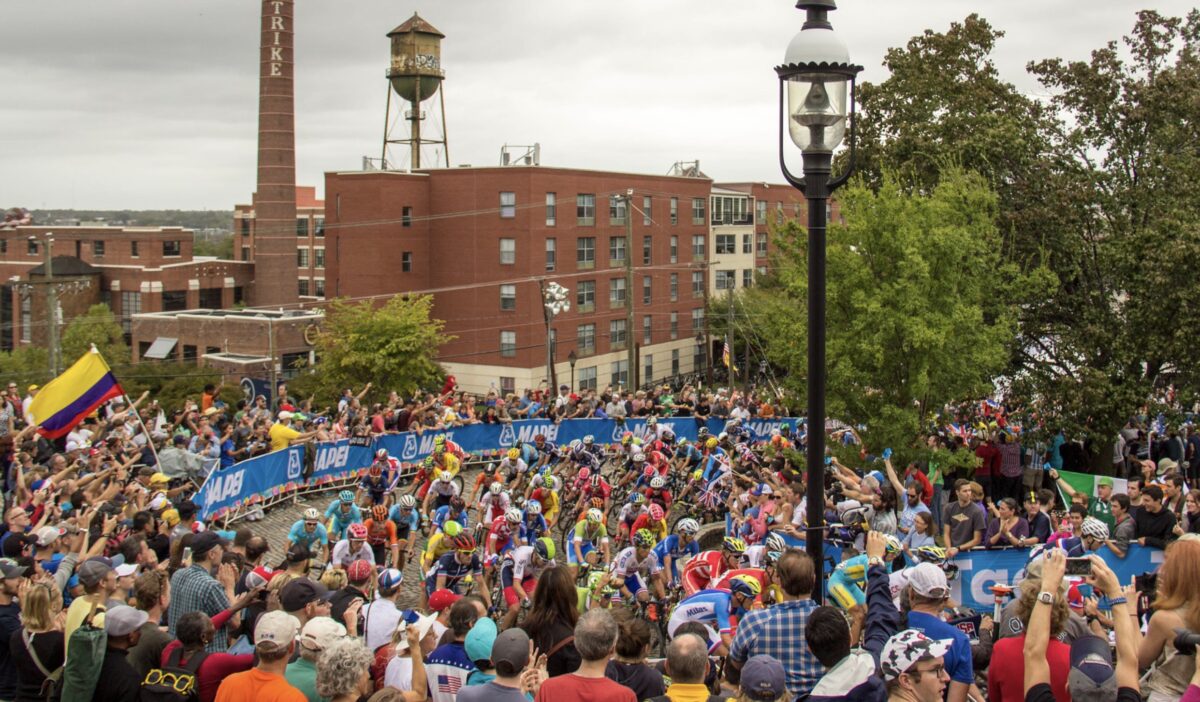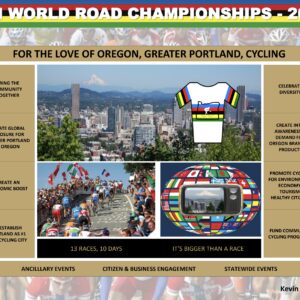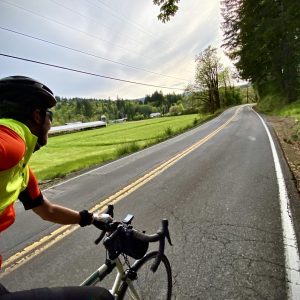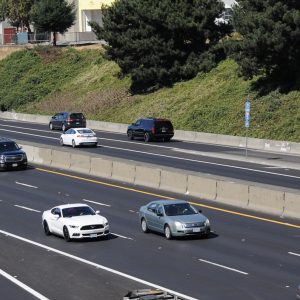
(Photo: Geoff Alexander/ Flickr Creative Commons)
“It’s safe to assume that overall impact will be somewhere north of $120 million.”
— Kevin Hyland, PDX Cycling Worlds, Inc.
A push to make Portland the host of the 2026 UCI Road Cycling World Championships received some good news last month when an independent analysis showed it could pump $80 million into the regional economy.
That was one of the top findings just released in an analysis performed by Portland-based economic research firm Dean Runyan Associates.
Kevin Hyland, executive director of the nonprofit PDX Cycling Worlds Inc., says that’s a very promising number that is likely to be much higher. “When you factor in all the indirect and induced spending, as well as the spending by the organizing committee, sponsors, the impact of all the ancillary events, and the incremental spending by the locals — it’s safe to assume that overall impact will be somewhere north of $120 million,” he shared in an email to BikePortland on Monday.
Advertisement
The 11-day event would draw participants, officials, sponsors, and spectators from around the world to see cycling’s best athletes compete in time trials (races against the clock) and a mass-start road race. Based on previous UCI Worlds held in the U.S. and Europe, Dean Runyan Associates estimates a total spectator count of 638,000 with 46% of them being local and 54% coming from outside the area.
Here’s more from the analysis:
342,000 visitor days: Projected visitor-days in the region as a result of UCI Champs amount to 342,600. Eighty percent of visitors are expected to spend the night in the Portland metro area.
$80 million in direct spending: Projected direct spending as a result of UCI Champs amounts to $80.1 million. Seventy-one percent of spending originates from overnight visitors, while the remainder comes from day visitors (8%) and teams, officials, and media (21%). Total spending by visiting spectators amounts to about $63 million, with an additional $17 million attributable to racing teams, officials, and media.
$30 million in earnings: Projected earnings as a result of UCI Champs amount to $30.5 million. This number includes earnings that flow to employees, as well as working proprietors.
$5 million in tax revenue: Projected state and local taxes as a result of UCI Champs amount to approximately $5.4 million. Local taxes ($2.7m) include lodging taxes and local levies on sales, such as for auto rental. State taxes ($2.7m) include state fuel taxes and income taxes paid by employees.
Hyland with PDX Cycling Worlds says Portland City Commissioner Mingus Mapps has officially signed on as a supporter of the event. Commissioner Carmen Rubio and Commissioner Dan Ryan have said positive things about it, Hyland said, but they are not official supporters yet. He’s scheduled to talk with Commissioner Jo Ann Hardesty next week and is working on getting an appointment with Mayor Ted Wheeler.
View the full report here or browse it below. Learn more about the event and the grassroots effort to bring it to Portland at PDXCyclingWorlds.com.
[pdf-embedder url=”https://bikeportland.org/wp-content/uploads/2021/04/PDX-Cycling-Worlds-Economic-Impact-Study-D-Runyan.pdf” title=”PDX Cycling Worlds Economic Impact Study D-Runyan”]
— Jonathan Maus: (503) 706-8804, @jonathan_maus on Twitter and jonathan@bikeportland.org
— Get our headlines delivered to your inbox.
— Support this independent community media outlet with a one-time contribution or monthly subscription.







Thanks for reading.
BikePortland has served this community with independent community journalism since 2005. We rely on subscriptions from readers like you to survive. Your financial support is vital in keeping this valuable resource alive and well.
Please subscribe today to strengthen and expand our work.
This analysis is very misleading. Economic impact analyses of large sporting event initiatives like these are not anywhere close to precise, only look at gross numbers, and ignore potential costs.
Some of the financial costs this analysis misses:
-increased traffic congestion = lost time for commuters in the workforce
-impact to working class communities on the outskirts of town in terms of road closures
-displacement of unhoused community members (not good) which, if accompanied by community care (potentially good) would increase cost to taxpayers
-environmental degradation at nearby natural/scenic areas and in town caused by the influx
-increased pricing on housing, food, transportation, and other public services used by locals
And the societal cost:
Competitive cycling is disproportionately and overwhelmingly white. In an overwhelmingly white town like Portland with its history of racism, redlining, and continuing racial issues stemming from gentrification, and just general cultural norms, this has the potential to impact people of color and culture more than others. One example would be how the event will be policed by the local popo who just can’t seem to stop doing racist things. There are more concerns but I’ll stop here for now.
I’m not saying PDX Worlds is a bad idea, that’s a separate topic. I’m just saying here that: this is a faulty analysis, more like an extended cheer leading piece for marketing purposes than an honest, all-encompassing examination from a perspective that includes impacts on the region’s most vulnerable people and places.
This is certainly a provocative comment. Yes, these analyses are promotions and not net analysis. There’s alot raised here and I’d like to see more exploration and exploration. Some of the assertions are damning of a sport I love, and hard to read.
I have to admit some incredulity about the arguments. I’m also wondering what would it be like to apply these standards broadly. Especially to other predominantly ‘white’ things like pickathon, or the Timbers Army.
Beer fests…Blazer games…Rose parade/festival….Saturday market(folks are living on the plaza and spaces used for it).
Gravel grinding… Cross Crusade…Sunday Parkways(especially in working class neighborhoods, increases traffic)…road diets(again, slows traffic)…zoning and land use planning(increases housing costs)…Portland Clean Energy Fund(increases food costs and other consumer goods)
Equity/Social Justice arguments can be used to support nearly any position. It’s the latest go-to argument for things that we don’t like for some reason.
A one-time sporting event that brings tourism dollars to the region. Is that really something to get worked up over? We better cancel the Rose Festival parade, Shamrock Run, Hood to Coast, etc.
Thanks for the comment Lisa. You make important points. As for the story itself, it wasn’t intended to examine the report… merely to share the existence of the report and share the major findings. I will often — in the interest of time — do stories like this so that the information can get out into the community and be subject to scrutiny and criticism just like what you’ve posted here. Thanks again.
Good morning Lisa. In response to your concerns…
-increased traffic congestion- Yes, there will be inconveniences, for 1 week, not too dissimilar from shutdowns associated with Bridge Pedal, Portland Marathon, Rose Parade, Burnside Bridge repair, TriMet Track repair, etc. The 11 individual races will be spread out across the metro area so that we’re not inconveniencing the same people every day. The good news- we have 8 years to develop and implement a communication plan & traffic re-routing plan that will give PBOT, TriMet and citizens plenty of time to prepare work-arounds. We will be recruiting an army of Community Ambassadors to work with the local communities to help us gather feedback, input and concerns, while keeping them informed.
-impact to working class communities on the outskirts of town in terms of road closures- We hope to host the road race grand departs outside the city, which will result in the lead-in routes being shut for 2-4 hours, Friday-Sunday.
-displacement of unhoused community members (not good) which, if accompanied by community care (potentially good) would increase cost to taxpayers- We have an initiative to create income opportunities for houseless residents and underemployed. And let’s hope that by the time this event rolls around, 8 years from now, we’ll have improved the lives & living conditions of our houseless residents.
-environmental degradation at nearby natural/scenic areas and in town caused by the influx- We’ll be recruiting an army of volunteers, many of whom will be tasked with cleanup, and we’ll be asking the same of all spectators. We will also be contracting with local businesses to manage trash & recycling.
-increased pricing on housing, food, transportation, and other public services used by locals
I’m not sure how this 9-day event will drive up prices. The Economic Impact Study only looks at the Direct Spending from Out-of-Metro visitors. When you include incremental spending by locals, as well as all the In-direct and Induced spending, and add in the impact of the Ancillary events (Oregon Wine Expo, Oregon Bike Expo, Oregon Beer Festival, International Food Festival, and more), the Economic Impact of the event will be somewhere north of $120M. The benefits to hotels, restaurants, retailers and businesses of all types, and to their suppliers and employees, will be tremendous.
And the societal cost: Competitive cycling is disproportionately and overwhelmingly white. In an overwhelmingly white town like Portland with its history of racism, redlining, and continuing racial issues stemming from gentrification, and just general cultural norms, this has the potential to impact people of color and culture more than others. One example would be how the event will be policed by the local popo who just can’t seem to stop doing racist things. There are more concerns but I’ll stop here for now.
PDX Cycling Worlds is a 501c3 non-profit, with a goal of donating proceeds to organizations around the state that inspire & enable girls, women, youth, and people of color to become cyclists- for their health, for the environment, and for fun.
Like the Olympics, these men and women compete for their countries, not their trade teams. Start-lists for World Championships in Bergen, Richmond, Innsbruck, included racers from 8 African nations, 9 Asian nations, and 13 South American nations. And in Greater Portland, where over 100 languages are spoken at home, we will create an amazing event celebrating cultural diversity.
Side note- Unlike many other professional sports, the Prize Money awarded to the winners of the Elite men’s & women’s road races and time trials are equal.
We’re also in the process of forming a diverse Community Advisory Council to provide feedback, thought leadership, informed recommendations and opinions on our entire operation. I’d love to talk with you about joining this Council. Please email me- info@pdxcyclingworlds.com
Thank you Kevin for a very informed response to Lisa’s concerns.
Even as an avid (but by no means professional) cyclist, I was somewhat apprehensive about the original announcement. Mostly around the congestion and the general craziness that results from hosting a big event like this one.
But after reading your response I’m more excited and supportive. It sounds like you’ve been involved in the organization and planning. Great job!
Thanks Walter!
@Kevin: Thank you for Spearheading this effort to expose our beautiful Portland to the world and through it, the benefits that comes, small or big…… I am certain your economic impact assessment is fairly accurate. As a person of color, I am also very thankful on your intent that the proceeds from this event will be donated to organizations around the state that promote causes to uplift girls, women and communities of color. Kudos!
@Lisa: Not sure how to interpret your comment as it’s a bit confusing to me.
On one hand, you seem to support the initiative but for the most part, your points suggest otherwise and in-fact, you seem to indicate that we should just live in our own bubble with no impact to our routine and our livelihood ….. Well, in this case, why not ban the Rose festival, H2C plus all other events around our city? it’s impossible.
It is my opinion, cities thrive with events such as UCI Road Cycling World Championships. The exposure cities get is tremendous due to the uptick from tourism following the event therefore, revenue from tax due to the benefits to businesses ….
Most often, Politicians tend to shape policies around such intiatives & cleanup their mess.
We have all witnessed cities preparing for such big in a big way anticipating the influx of visitors…. Who knows, we may even get lucky and the ongoing initiative to address homelessness in our town get a boost as this will give one more reason to address it?
I would personally encourage you to review & reconsider your comment and if possible, rally around the cause 🙂
Best!
Seged
You are 100% spot on that these pieces are cheerleading for the project. They always are. In the event the consultant couldn’t justify some large number (and let’s be frank any large event will bring in lots of money), the report wouldn’t be released.
That said, I take issue with your first point on increased traffic congestion. While I understand there can be downstream equity impacts to congestion, I think the only way to move beyond our current car culture is to stop caring. Maybe this event is a justification for creating space for transit so people who rely on that don’t face excess delay? To me congestion means that we are using the roadway appropriately in the sense that we didn’t overinvest in it. It’s only full for a short period each day, most of the day it’s actually very empty.
Think of all the lost KOMs
I hope the course goes around the MLB stadium.
It also means there would likely be a Portland world to join on Zwift!
And the Richmond course has been ridden more than 1 million times- the event will live on for many, many years!
While I admire big dreams, I think we have more fundamental issues to tackle as a city before taking something like this on.
How about a new indoor velodrome, now that Alpenrose is closing? There are still only a few in the country.
Bike Guy,
You just shushed away this dude’s massive effort to do something cool and amazing because you want more “fundamental” stuff and then said we should do an indoor velodrome. OK. How about dedicating your life to that cause!? When you have your nonprofit up and running and are ready for some PR, send me an email so we can do a story about it!
if there’s a push to create a new velodrome, sign me up!
I grew up near Alpenrose, and have attended events there since early 70’s, and my son rode the kiddy-kilo many years ago. There are efforts underway to build a new velodrome in the city. But not sure that not having a velodrome is a “fundamental issue” for the city.
i hope the event production improves some of our road surfaces either by design or by implication
The Portland Diverter Criterium
I’ve started using my gravel bike for road rides around Portland.
I’m curious as to what the UCI is looking for in a host city. I am sure if they did a visit now it wouldn’t be such an attractive site. The state of downtown would seem to be a deterrent. Also, what would be a good site for the road course or the time trial? It would be awesome though if it did happen
Oh man, there are soooo many amazing road courses you could do. The gorge, lolo pass, out past Barton Park to Sandy, down through Champoeg. How cool would it be if they did a bunch of west hills climbs? Up Lolo Pass, down Gtown, up Newberry. There is so much amazing riding, especially with some road closures.
How about Larch mountain for the TT? Or a lap around Sauvies Island.
Oh hell, get those mad geniuses at OMTM on this task and you could get some really crazy routes.
The people out in Corbett would lose their minds if they closed the roads for a cycling event. It would be great.
I would love to see a circuit from downtown through the West hills. The TV coverage of the battles on College would be epic.
I would love to see this event happen in Portland but I think it is not going to be easy for the organizers. As you can see from the above comments there will be a lot of resistance for a variety of reasons.
It would also be nice to have a smaller one-day pro event like the USA Crit series, or the former Philadelphia cycling classic in the meantime. I’ve always been kind of baffled that there aren’t any pro races in the bike-friendly city of Portland.
Races here are not sanctioned by the UCI recognized national federation.
There is no reason why there couldn’t be a USAC-sanctioned professional race held in Portland. As far as I know, OBRA doesn’t have exclusive rights to races in Oregon.
I lived in Boulder, CO during some of the Red Zinger Classics. As a non-racing, non-business-owning cyclist I got exactly zero benefit. I was once unlucky enough to live near one of the courses, and for entire days, not just when a race was actually happening, I couldn’t even cross the streets. Also, some racers blow through stop lights & signs training. This pisses off drivers no end. Boulder changed from a nice little town to bike in to having such hostile drivers that riding in city traffic when I moved to Denver was a relief. Portland already has road racers speeding in commuter/recreational bike lanes instead of traininf on, like, roads. How much fun it will be to have more of that when this event gets going. Just because we already endure disruptive events that benefit only a few is not an argument for adding another one.